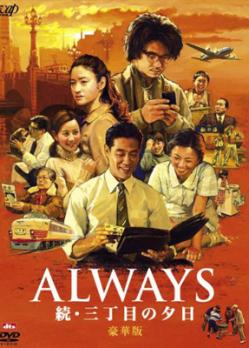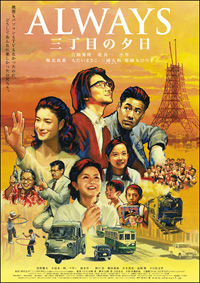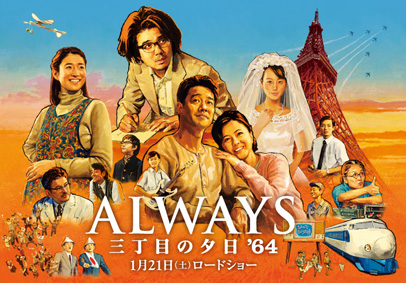Always Sunset on Third Street 2

Always Sunset on Third Street 2 (ALWAYS 続・三丁目の夕日), directed by Takashi Yamazaki (山崎貴), 2007, 146 minutes
Review by Susan Meehan (contains plot spoilers)
As the Embassy screening of Always Sunset on Third Street 2 ended, I wished I’d seen the first in the series; not just because it’s a delightful family drama, but because I hadn’t quite worked out the relationship between certain characters– take that of the gifted young boy Junnosuke (古行淳之介) and the writer manqué Ryunosuke Chagawa (茶川竜之介) for example. But it is a straightforward enough plot and the film can be seen and enjoyed in its own right.
The first film in the series (ALWAYS 三丁目の夕日 – a 2005 release) was chosen Best Film at the Japan Academy Prize ceremony. The films are based on Ryohei Saigan’s (西岸良平) long-running manga of the
same name, which might account for the protagonists’ occasionally overblown reactions, cue Mr Suzuki with his terrible hair-raising (his own!) temper.

The film is set in 1959 Tokyo and dynamically starts with an emergency broadcast about a Godzilla-like monster trampling over the recently-built Tokyo Tower. As it continues pummelling the streets, it becomes apparent that the audience has been made privy to the writer Chagawa’s imagination and his burgeoning novel. But, as his ward Junnosuke, says, it is a rather pathetic copy of Godzilla.
Having emerged the other side of the Second World War, life is tough in Tokyo and the effects of the war are still in evidence. Families are frugal and seem a little displaced. When Mr Norifumi Suzuki, of Suzuki Autos, a small auto repair shop, receives an invitation to meet up with his war buddies’ group, the emotional toll of the war is introduced. There is, however, a palpable feeling of relief at being alive and a real sense of community spirit and optimism as people are more than happy to help one another.
A number of characters and story threads are interwoven into the plot and Always Sunset on Third Street 2 brims with the hustle and bustle of downtown Tokyo. It compels and engages from the start with its strong ensemble cast and the terrific set of Tokyo, a protagonist in its own right and appearing very photogenically.
The Suzukis, a loving and affable family, take in seven-year-old spoiled brat Mika, a cousin whose mother has died and whose father cannot look after her while, recently out of a job, he looks for new prospects. Forthright Ippei Suzuki, close to her in age, finds his cousin hideously snooty. She criticises the sukiyaki for being made with pork rather than beef, laments the Suzukis’ tiny rooms and is horrified that they eat with their ‘maid’, who is in fact Mutsuko, a young apprentice form Aomori Prefecture. Ippei battles against her, telling her some truths and calling her stinky when she refuses to join them in a bath at the nearby sento, not having bathing facilities themselves.
Mika declares that Ippei has no ‘delicacy’, using the English word and he sets out to discover what this elusive delicacy is. “Is it something American?” wonders Junnosuke, in whom he confides or, “Some kind of sweet?”
A host of other stories occur alongside that of the Suzukis.
Hiromi Ishizaki, once upon a time Chagawa’s sweetheart (this is developed in the first film) and now working in a risqué revue club under the name of Betty, occasionally dreams of him, confident that he’ll make it as an author. Chagawa himself, a grungy Tokyo University graduate with academic pretensions, is as poor as a church mouse and intent on winning the Akutagawa-sho, a major literary prize, for the cash prize and recognition in order to look after Junnosuke and have a chance with Hiromi.
Chagawa* completes a romantic short story and is shortlisted, in fact, for the Akutagawa Prize. His street, he lives opposite the Suzukis, is ready to celebrate what they are convinced will be his win. I’m not sure why he is so loved – being quite selfish and introverted compared with the exuberance of the other characters; perhaps that is his charm.
I won’t completely spoil the plot by revealing the ending. Needless to say, Hiromi is moved by Chagawa’s story, an ode of love to her, and Mika is reunited with her father. Though happy to see him she’s devastated at leaving the warmth of the Suzukis. She has learnt to be less stuck-up from adorable Ippei. He, by the way, manages to find some ‘delicacy’ and gives Mika a lovely set of coloured pencils as a parting present.
Ending on a positive note – largely that love is far more precious than money – the protagonists, in separate bands, gaze up at the beautiful sunset. All bodes well for this small and delightful enclave within Tokyo. I could not help feeling rather moved.
It is an unabashedly nostalgic, touching and feel-good film with loads of laughs, tinged with a few saccharine moments but refreshing and just the tonic in these austere and pessimistic times. It shines bright.
I look forward to the next sugar-rush in the form of the sequel [ALWAYS 三丁目の夕日’64 – released in Japan on 23rd January 2012].

Notes
* Chagawa is wonderfully played by Hidetaka Yoshioka (吉岡秀隆) who I remember playing the part of loveable Tora san’s little nephew in the Otoko wo Tsurai yo (男はつらいよ) film series. He won the Japan Academy Award for Best Actor in 2006 for Always – Sunset on Third Street.

